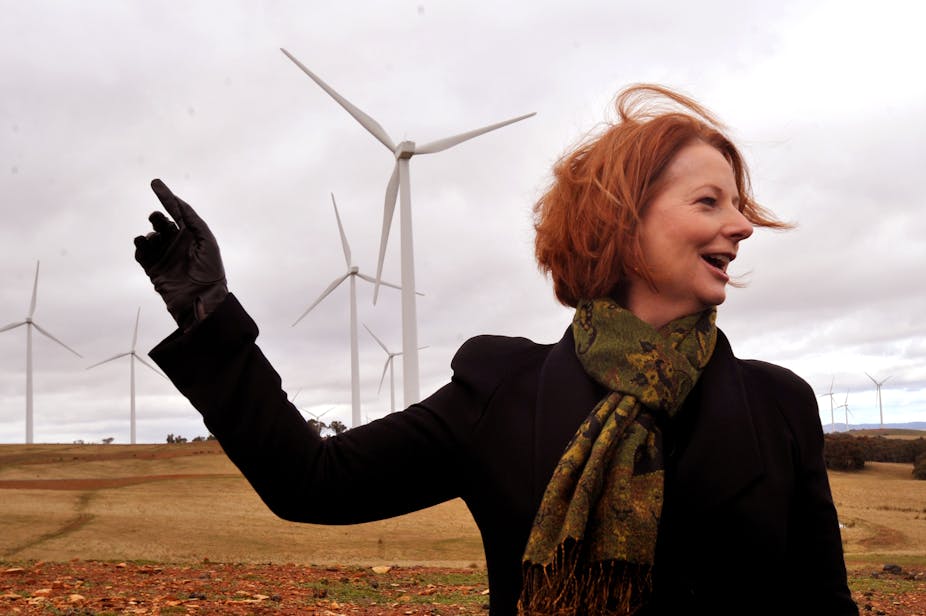Prime Minister Julia Gillard last week used the example of Spain to indicate how Australia’s energy mix could be transformed.
The potential for this transformation is nothing more than wishful thinking. Her prediction overlooks the differences between Australia’s and Spain’s energy systems and the viability of future options.
Some commentators have criticised Gillard for comparing Australia with an economically-devastated country.
But that Spain is in recession is not the point. Gillard’s commitment to the expansion of Australia’s renewable energy sector is commendable. But it ignores the realities of Australia’s existing energy system.
Australia is one of the world’s largest producers and exporters of energy. It’s the world’s largest coal exporter, and is a significant exporter of natural gas.
Australia’s economy also relies on revenues generated by exploitation of other commodities, such as iron ore and uranium. Australia is also the largest exporter of lead and zinc and a significant exporter of copper, nickel, gold and many other mineral commodities. The production of these commodities is energy-intensive.
Meanwhile, Spain is an energy-poor country, which, like Japan or Germany, is heavily reliant on imports of fossil fuels. According to European Commission data, Spain has a 77.4% energy import dependency. Such is the extent of dependence on fossil fuel imports that domestic production is mainly related to nuclear energy and renewables.
According to BP, in 2010, 14.7% of Spain’s energy was generated from renewable sources. In terms of total generating capacity, Spain’s renewable sector is behind only the US and Germany.
Meanwhile, in Australia the sector is in its infancy, with only 1.3% of energy generated from renewable sources. The figure increases to 4.1% if hydroelectricity is included.
Certainly, Australia has much potential to expand its renewable sector. Without doubt, the share of renewables will increase in Australia’s energy mix over the next few decades, possibly coinciding with the Federal Government’s Mandatory Renewable Energy Target.
But following the example of Spain would amount to political and economic suicide for the “lucky country”.
In the energy market, more than in any other market, relative prices matter. Energy transitions are very slow affairs and fossil fuels have no cost-competitive alternatives on a global scale.
It will take at least two decades before this may be a possibility. Australia has ample supplies of cheap fossil fuels. Spain has none.
Energy security also matters. Australia is one of the world’s largest energy exporters, supplying mainly Asian markets with its fossil fuels.
Spain is in global top ten of oil and natural gas importers. It largely relies on imports from the Middle East, Africa and the Former Soviet Union. These regions have been unstable in recent years.
Comparing two countries with entirely different energy system characteristics makes no sense.
For Spain, an energy-poor country where security of fossil fuel supplies is a matter of national security, renewable energy is a viable and perfectly rational option.
For Australia, for the time being, renewable energy makes no economic or political sense. A major commitment to renewables would increase the cost of living and alienate some of the country’s largest and most lucrative businesses.
The reality of this situation implies that Australia cannot be a leader in renewable energy.
Regardless of the political commitment it will always remain a laggard. It will never be able to compete with energy-poor countries such as Germany, Spain or Japan.
Nor should it. There is no international expectation or some broader moral imperative for Australia to wholeheartedly commit to renewable energy.
Australia is a reliable supplier of fossil fuels to the global energy markets. Unlike many other countries, it rarely uses its energy riches to gain leverage in other arenas. This has been recognised time and again by many Asian leaders.
In terms of future comparisons, the Prime Minister and other policy-makers should draw comparisons between Australia and Canada or Russia.
These latter two countries share similar energy characteristics with Australia. They are both geographically vast countries and rich in fossil fuels. They are large carbon-intensive economies and energy exporters.
Julia Gillard should avoid drawing comparisons that don’t stand up to scrutiny.

